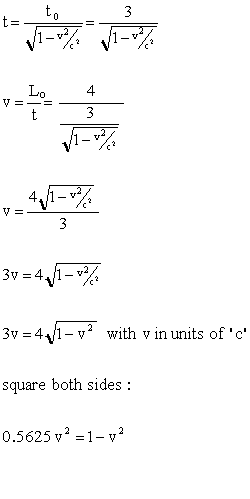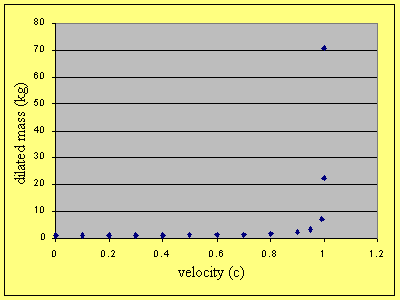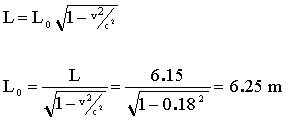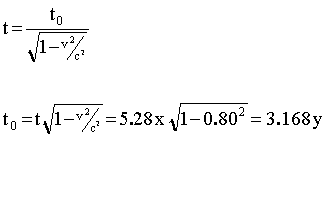Chapter 30 - Worked Solutions
to selected extension questions from the OUP text Senior Physics -
Concepts in Context by Walding,
Rapkins and Rossiter
My thanks to Peter Finch from St Joseph's College, Gregory Terrace, for these (pdf) solutions.
Solutions-Ch30-Finch.pdf
The rest are by me, Richard Walding:
Question 29
Yes (but the difference is very very small).
Question 30

Question 31
l = 5.80 m; v = 0.760 c
(a) l0 = 8.92 m long; no change to height
(b) t = 20.0 s
t = sv = 20 x 0.6499 = 13 s
(c) v is the same (0.760 c).
Question 32
l0 = 4 ly; t0 = 3 y; v = ?

Question 33
t0 = 7 y; v = 0.8c; t = ?
(a)

(b) Takes 11.67 y for signal travelling at c to reach Earth,
therefore total time = 9.336y + 11.67y = 21.0 y
Question 34
(a) EK = mc2 - m0c2 = c2(m - m0)

= 9 x 1016 (20656 - 20000)
= 5.9 x 1019J
(b) EK (classical) = ½ mv2 = ½ x 20000 x (0.25 x 3 x 108)2
= 5.675 x 1019 J
D
E = 2.75 x 1018 J
% difference = 2.75 x 1018 x 100 / 5.9 x 1019 = 4.7%
Question 35

|
v |
m (kg) |
|
0.0 |
1.000 |
|
0.1 |
1.005 |
|
0.2 |
1.021 |
|
0.3 |
1.048 |
|
0.4 |
1.091 |
|
0.5 |
1.155 |
|
0.6 |
1.250 |
|
0.7 |
1.400 |
|
0.8 |
1.667 |
|
0.9 |
2.294 |
|
0.95 |
3.203 |
|
0.99 |
7.089 |
|
0.999 |
22.37 |
|
0.9999 |
70.71 |

Question 36
L0 = 6.00; v = 0.18c; your car L = ?

Which is the length you measure his car to be.
Your car as measured by him is 6.15 m (ie L = 6.15 m)

Which is what you measure your car to be.
Question 37
L0 = 4.225 ly; v = 0.80 c

(a) v = L0/t
t = L0/v = 4.225/0.80 = 5.28 y
(b)

(c) L = 2.535 ly
 Return to Physics Text Home Page
Return to Physics Text Home Page






